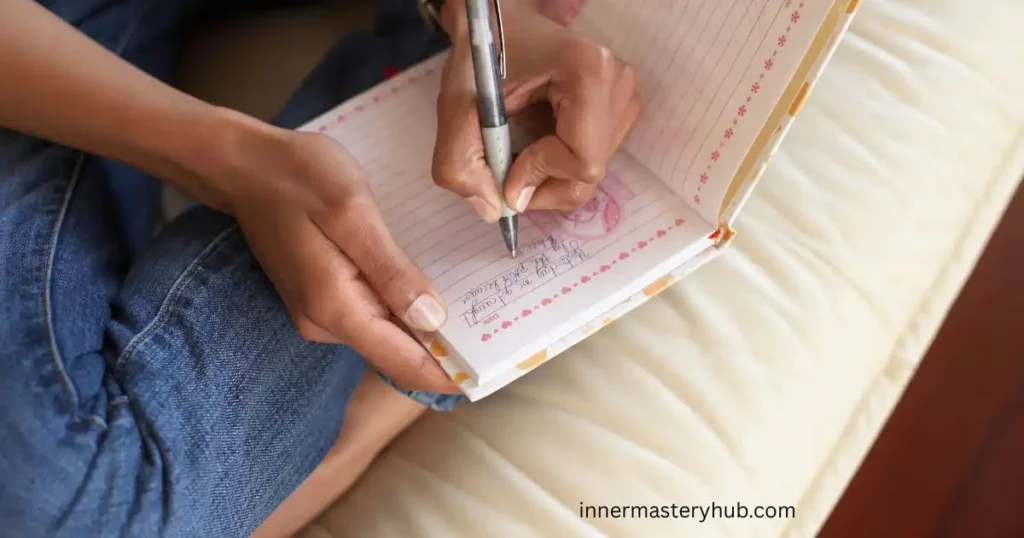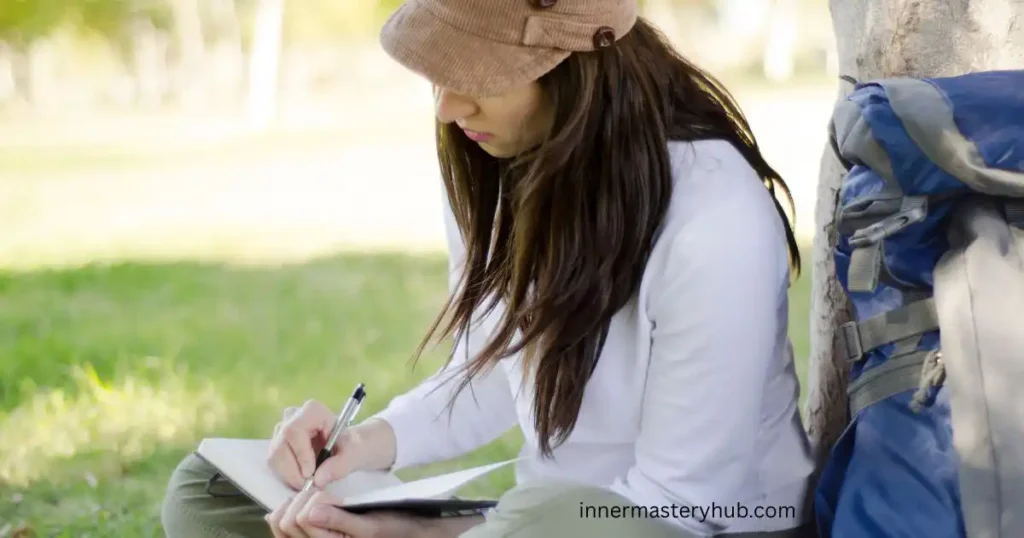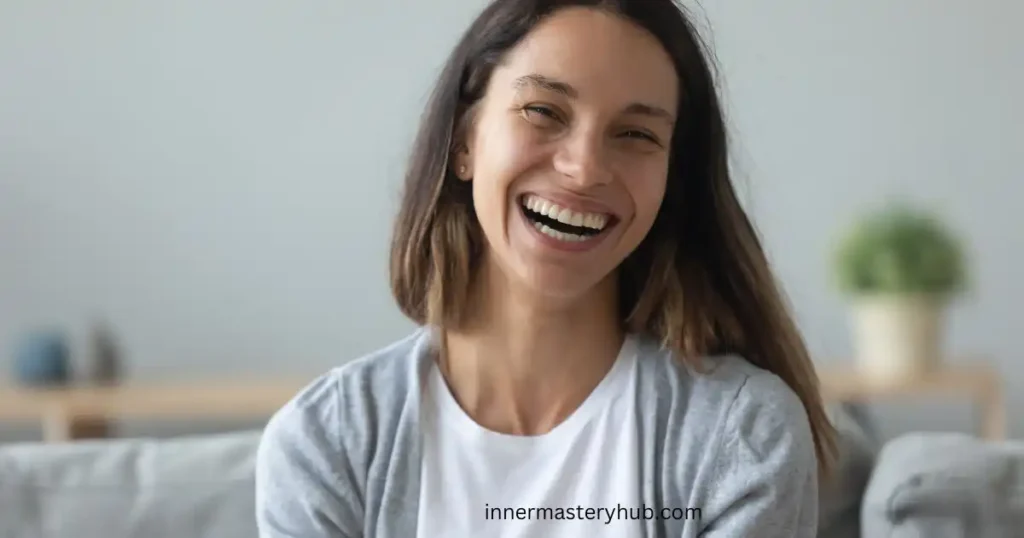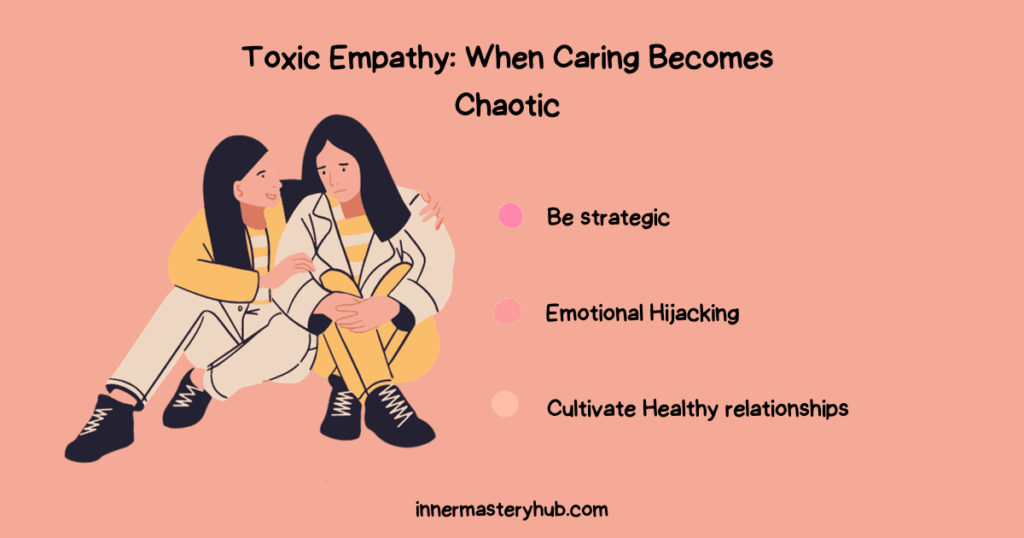100 Journal prompts for women to Awaken Your Creativity

You can use Creativity as a powerful weapon in your life. It nourishes your ideas, your hobbies, and your global connections. But, like many women, you may feel that your Creativity has been overlooked.
You feel as though you’ve lost the creative spark you once possessed as life becomes hectic and obligations increase.
This post contains journal prompts for women in their 30s that can help you rediscover your creative side. These simple journaling prompts aim to inspire new ideas, overcome mental challenges, and help you return to a state of Creativity.
You can regain your potential and develop routines that help you stay creative and keep your mind active by applying these simple journaling prompts.
Creativity Gets Lost in the Shuffle
There are numerous responsibilities in life after thirty. You may have a lot of time and energy devoted to work, family, health, and social obligations. It’s simple to neglect your creative demands while juggling everything.
Your creative abilities seem far away before you realise it. Perhaps you’re feeling stuck in a routine, wondering when you last had a breakthrough thought, or you think your spark has faded.
Many women in their 30s have this issue. When they reach adulthood, almost 60% of adults report feeling that they have no more time for creative pursuits such as writing, drawing, or creating music. Women in particular frequently have to deal with the extra burden of juggling family, career, and self-care, which makes Creativity even more challenging to prioritise.
The Struggle to Reconnect with Your Creative Self by using journal prompts for women
Do you know how it feels to try to get your creative juices flowing but get no results? It isn’t enjoyable. As you settle down with your diary, you expect to write something amazing, but instead, you are staring at a blank page. Feeling like your creative juices have dried up is depressing.
Even if you’ve always been creative, the stresses of daily life can begin to sap your creative vitality. Perhaps you feel as though you have no more time for writing or creating art. Maybe you believe that your creative zenith has passed, or you’re unsure how to reignite it.
The problem is that Creativity does not simply vanish. It remains there, just waiting to be used. But you have to make room for it to achieve that. You must change your perspective and resume prioritising your creative endeavours.
Don’t worry if you feel overloaded or blocked. You’re not by yourself. The good news is that with a few easy, regular measures, you can re-establish your creative life.
Journal Prompts for Women in Their 30s to Awaken Creativity.
Keeping simple journaling prompts in practice is one of the best ways to tap into your creative side. It enables you to explore ideas, communicate your thoughts, and clear your mind. The following list of journaling prompts for women can inspire your Creativity.
1. What do I love doing, and when was the last time I did it?
This prompt might change everything. We frequently become so engrossed in our everyday obligations that we lose sight of our true passions. Perhaps you were once passionate about dancing, poetry, or sketching. By reviewing these exercises again, you’ll reignite your creative spark.
Consider what you really enjoy doing for a bit. Describe a moment when you were at your most creative. Why was that particular moment so memorable? This week, intend to do something similar.
2. What’s a new skill or hobby I want to try, and why?
Sometimes, attempting something new is the best way to spark Creativity again. You are pushed out of your comfort zon,e and your brain is stimulated by new experiences. New hobbies can be motivating and enjoyable, whether you’re learning photography or ceramics.
Jot down something you’d like to attempt that’s new. It’s not essential to be flawless. Emphasise the excitement and discovery that accompany education.
3. What’s holding me back from being more creative?
You must address the challenges you face to proceed. Lack of time is one example of an external barrier. At other times, such as perfectionism or fear related to failure, they are internal.
Consider what is holding you back from moving forward. Is time a problem? Are you worried about being judged? Put your anxieties on paper and then consider doable strategies to get past them.
4. How can I make time for my Creativity each day?
We are all aware of the value of time. However, you may find opportunities for Creativity throughout the day. A mere ten minutes of journaling, sketching, or brainstorming can have a profound impact.
Establish a daily routine for your Creativity by writing in simple journal prompts each morning, or drawing while eating lunch could be enough. Perfection is not the aim; constancy is.
5. Who or what inspires me creatively?
There is inspiration everywhere. A person, location, book, or even a statement could be the subject. Reflecting on your inspirations will help you recall the creative influences that have shaped your life.
Write about something or someone that makes you feel creative. Consider why they affect you in that way. Fuel your own creative path with this motivation.
6. What does Creativity mean to me?
Not everyone has to be creative in the same way. For some, writing is it. For others, it’s gardening or cooking. Establishing your own definition of Creativity is crucial.
Put your definition of Creativity in writing as an action tip. How does it seem in your life? How can it be cultivated more consistently?
7. How can I make my creative space more inspiring?
Your surroundings have a significant impact on how you create. A disorganised or uninspired environment can stifle your Creativity. You can improve your focus and sense of connection to your job by setting apart a specific area for your creative endeavours.
Examine your area. How might you modify it to make it more motivating? Eliminating distractions or incorporating unique elements, such as artwork or plants, could be the solution. Make an environment that supports your Creativity.
8. What creative projects have I always wanted to start but haven’t yet?
Have you been putting things off? Something you’ve always wanted to do but never had the time or energy to do? This exercise helps clarify your long-term artistic objectives.
Jot down the artistic endeavours you’ve always desired to embark on. What is preventing you? Write about the first action you can take, no matter how modest, to begin these initiatives.
9. What does my ideal creative day look like?
Determining what you genuinely want to produce and experience can be aided by visualising your ideal creative day. It also provides you with something to work for.
Shut your eyes and visualise the creative day you’ve always wanted. How are you? Where are you? Who are you with? Describe this day in as much detail as you can.
10. How can I turn everyday tasks into creative opportunities?
Creativity doesn’t need to take place in an art gallery or studio. It might be a regular part of your day. There are always chances to be creative in your day, whether you’re cleaning, organising, or cooking.
Examine your everyday schedule. How can it be made more creative? Trying a new recipe or creatively rearranging your living room could be the answer. The secret is to look for beauty in the ordinary.

100 journal prompts for women to help inspire Creativity, self-reflection, and personal growth
- What are three things I’m grateful for today?
- What does my ideal morning routine look like?
- What does Creativity mean to me?
- What activity makes me feel most alive?
- How do I feel about change in my life right now?
- When was the last time I tried something new?
- What is one goal I’ve always wanted to achieve but haven’t yet?
- What’s something I’ve always been afraid to do, but deep down, I really want to try?
- Who in my life inspires me, and why?
- How do I define success for myself?
- What would my perfect day look like, from start to finish?
- What does self-care look like for me?
- What is my current relationship with time, and how can I improve it?
- What old habits do I want to let go of, and what new habits do I want to cultivate?
- How can I make more time for Creativity in my day-to-day life?
- What does my dream career look like?
- What would my life be like if I embraced my creative side more often?
- What does it feel like when I’m genuinely in flow?
- How can I build a more positive mindset each day?
- When was the last time I felt fully in touch with my emotions?
- How do I handle criticism, and how can I be kinder to myself?
- What are the things that trigger my stress, and how can I better manage them?
- If I could write a letter to my younger self, what would I say?
- What are my core values, and how do I live by them?
- How do I deal with failure, and what can I learn from my past experiences?
- What is something I can do today to make my future self proud?
- What are my favourite hobbies, and how can I make more time for them?
- What is one way I can bring more joy into my life today?
- What would my life look like if I stopped worrying about other people’s opinions?
- How can I incorporate mindfulness into my creative process?
- What does the phrase “living authentically” mean to me?
- When I look at my life, what part of me feels the most fulfilled?
- How does nature inspire me, and how can I connect with it more often?
- What emotions do I struggle with the most, and how can I begin to heal them?
- How do I express my Creativity when I feel overwhelmed or blocked?
- What creative projects have I always wanted to start but haven’t yet?
- How do I feel about my body and the way it functions?
- What is my idea of the perfect creative space?
- How do I balance work, family, and personal time while maintaining Creativity?
- What is the one thing I wish I could tell my future self?
- How do I react when things don’t go according to plan, and what can I do to change that?
- What is the biggest obstacle I face when trying to be creative?
- How can I practice gratitude daily, even when life gets tough?
- What are my top three priorities for the next six months?
- How can I show up for the people I care about, and what steps can I take to improve?
- What habits do I need to break to feel more empowered?
- How do I feel about ageing, and what mindset shift would help me embrace it more fully?
- What does success look like for me, and how do I measure it?
- How can I make my workspace more inspiring for Creativity?
- What is one small step I can take today to make my dreams a reality?
- How does my current routine support or hinder my Creativity?
- What new creative project do I want to start this week?
- When was the last time I felt proud of myself?
- How can I become more open to receiving love and support?
- What creative outlet makes me feel the most fulfilled?
- How do I deal with procrastination, and what can I do to overcome it?
- What do I do when I’m feeling unmotivated, and how can I adjust that behaviour?
- How can I nurture my inner child, and what impact does this have on my Creativity?
- What are three things I can do today to step out of my comfort zone?
- How do I express my Creativity when I feel uninspired?
- What personal goals have I set for myself this year?
- How do I maintain balance in my life when I feel overwhelmed?
- How can I add more spontaneity to my daily routine?
- What advice would I give to a friend who feels stuck creatively?
- What is my definition of a meaningful life?
- How do I respond to challenges, and what can I do to change that response?
- How can I start to prioritise my creative goals more?
- What small act of kindness can I do for someone today?
- How do I define “peace,” and how can I bring more of it into my life?
- What does my self-talk sound like, and how can I make it more positive?
- How can I be more intentional with my time each day?
- How do I nurture my creative relationships with others?
- How do I deal with perfectionism, and how can I let go of it?
- What’s one thing I can do to encourage my Creativity today?
- How can I make time for rest without feeling guilty about it?
- How do I feel about expressing myself through art, and why?
- What kind of impact do I want to leave on the world through my creative endeavours?
- How do I overcome self-doubt, and what strategies can I use to push through it?
- What is the most important lesson I’ve learned in the last year?
- How can I make space for creative projects without feeling overwhelmed?
- What would my life look like if I trusted myself more?
- How do I express love for myself in my daily life?
- What do I want to create, and what’s stopping me from making it?
- How do I manage stress in creative work, and how can I improve it?
- How can I foster deeper connections with the people around me?
- What would it feel like to let go of fear of judgment completely?
- How do I feel about my relationship with technology, and what can I do to improve it?
- What inspires me to be creative, and how can I seek out more of it?
- How can I embrace vulnerability in my creative work?
- What has been the most challenging aspect of my creative journey?
- How do I stay motivated when working on long-term creative projects?
- What kind of art do I feel drawn to, and why?
- How do I react to setbacks in my creative process, and how can I change that?
- What creative habit would I like to develop, and how can I start today?
- How can I find inspiration in the everyday moments of my life?
- What do I wish I had more time for, and how can I make that happen?
- How does my environment affect my creative output, and how can I change that?
- What is something I want to learn to do, and how can I make it happen?
- How can I make my creative work more meaningful to myself?
- What would I do if I knew I couldn’t fail?
Rekindle Your Creative Spark Today by writing journal prompts for women
You can regain your Creativity with a bit of work and purpose; it’s not something you lose. Using simple journaling prompts for women to spark your Creativity will allow you the freedom to experiment, explore, and develop. The secret is to be consistent—make time every day to think and engage with your creative side.
It’s normal to feel that your Creativity has diminished, so keep that in mind. You can revive it, though, provided you have the correct attitude and equipment. Now take out your journal and get exploring!
Frequently Asked Questions (FAQs) About Journal Prompts for Women
What are journal prompts for women over 30?
Journal prompts for women are thought-provoking questions or statements designed to inspire self-reflection, Creativity, and personal growth. For women over 30, these journal prompts for women can address life transitions, career shifts, and evolving personal goals.
How can journal prompts for women benefit them in their 30s?
Journaling helps individuals process their emotions, set new goals, and gain a deeper understanding of themselves. It offers clarity during significant life changes and fosters mindfulness.
Can journaling help with stress management?
Yes, expressing thoughts and feelings through writing can alleviate stress, reduce anxiety, and promote emotional well-being.
How often should I use journal prompts for women?
Consistency is key. Aim for daily or weekly sessions, depending on your schedule, to build a meaningful journaling habit.
Do I need a special journal for this?
Any notebook or digital device can serve as your journal. Select something comfortable and convenient for everyday use.
What if I don’t know how to start?
Begin with simple journaling prompts, such as “What am I grateful for today?” or “What challenges did I face this week?” Let your thoughts flow naturally.
Are there simple journaling prompts tailored for specific life events?
Absolutely. Simple journaling Prompts can focus on various themes such as career changes, motherhood, personal achievements, or health journeys.
Can journaling improve my Creativity?
Yes, regular writing stimulates the mind, encourages new ideas, and enhances problem-solving skills.
How can I stay motivated to use journaling prompts for women regularly?
Set achievable goals, such as writing for 10 minutes daily, and reflect on the positive impacts that journaling has on your life.
Where can I find more journal prompts for women?
Explore online resources, books, and communities dedicated to journaling. For instance, the article “50 simple Journaling Prompts for a Midlife Woman’s Journey to Self-Discovery” offers valuable insights.
What topics do journal prompts for women cover?
Prompts often explore topics such as self-care, love, gratitude, mental health, dreams, career goals, relationships, identity, and confidence. They help women connect with their inner selves, recognise achievements, process emotions, and plan for the future with positivity and purpose. Topics vary based on personal growth needs.
Can simple journal prompts help with anxiety?
Yes. Writing about worries, gratitude, or positive affirmations can help release anxiety and create a sense of calm. Prompts focused on mindfulness or reflection let women understand triggers and build coping strength. Journaling transforms overthinking into clear thoughts, helping manage emotions and promoting inner peace naturally.
Are there simple journal prompts for self-love?
Absolutely. Self-love prompts encourage reflection on strengths, boundaries, forgiveness, and gratitude. Examples: “What do I love about myself?” or “How can I treat myself kindly today?” Such prompts nurture confidence, compassion, and self-acceptance, reminding women of their worth and power.
What tools are needed for simple journaling prompts?
Just a notebook and a pen are all that’s needed. Some women prefer digital journals or apps for convenience. Add stickers, colours, or inspirational quotes for creativity. Choose whatever feels comfortable to make journaling a joyful, relaxing, and personal space for self-expression each day.
How do I start journaling with prompts?
Begin by choosing one prompt daily. Don’t worry about grammar—just write freely. Set aside quiet time and be honest with feelings. Over time, writing becomes easier and more enjoyable. Let prompts guide your thoughts, not limit them—there’s no wrong way to journal.
Where can I find good journal prompts for women?
You can find them in books, blogs, Pinterest, or wellness websites. Many offer themed, simple journaling prompts, such as self-care, healing, or goal-setting. You can also create personal prompts that match your life goals. Choose ones that inspire you to think deeply and grow positively.
What topics do journal prompts for women cover?
Prompts often explore topics such as self-care, love, gratitude, mental health, dreams, career goals, relationships, identity, and confidence. They help women connect with their inner selves, recognise achievements, process emotions, and plan for the future with positivity and purpose. Topics vary based on personal growth needs.
What time of day is best for practising simple journaling with prompts?
Morning journaling boosts motivation and clarity for the day, while evening journaling helps reflect and unwind. Choose what feels best for your schedule. The key is consistency—writing at a calm, distraction-free time makes journaling more effective and emotionally rewarding.
Can journal prompts for women help with healing past trauma?
Yes, gentle prompts about forgiveness, self-worth, and emotional release can support healing. Writing helps women process memories safely, understand feelings, and rebuild strength. While journaling isn’t a substitute for therapy, it’s a powerful self-help tool for emotional recovery and inner peace.
Are journal prompts for women suitable for goal-setting?
Absolutely. Prompts help women clarify dreams, set intentions, and plan realistic actions. Writing about future goals, motivation, and challenges builds accountability and focus. It turns big dreams into clear, step-by-step plans, making success feel achievable and meaningful.






